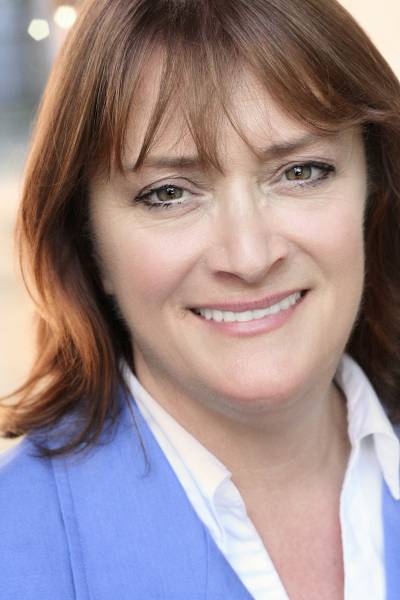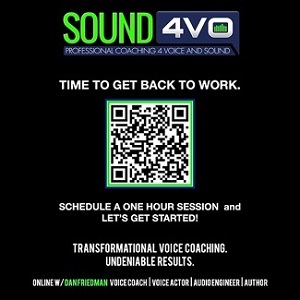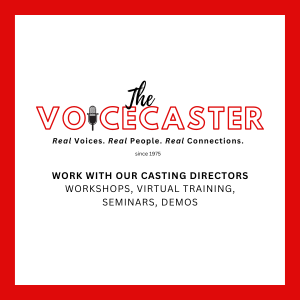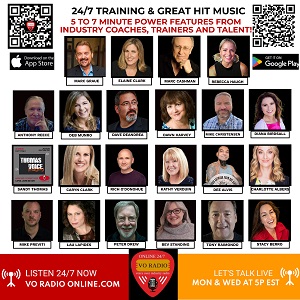|
VOICE ACTING 'Talk British To Me!' ... A Desirable Talent For Voice Actors - Here's What To Practice January 12, 2018  By Sarah Mitchell By Sarah Mitchell Voice Talent & Actor American audiences love the British accent, which is something that I am immensely grateful for in my career. In regular day-to-day life here in the U.S., it also really helps to have this accent. We British apparently sound more intelligent, and make words sound "so pretty.". When I first came to the U.S. the locals would wobble their heads and say "allo I'm Bw-itish, 'ow are ya guv'nor?" It was really amusing at first. But, I will still smile and laugh with folks politely when it happens today, although I've never really figured out why y'all think we wobble our heads when we speak. LOVELY ACCENT FOR VO Having one of the many British accents in your list of character voices is desirable for any working American actor or VO talent. Brits have lots of lovely accents to learn and play with. Have you noticed how many evil leads in action movies have 'the' accent? There are a lot of very popular TV shows and films made in the U.S. with at least one Brit! So there is plenty of work out there for anyone who can get the pronunciation correct. That's all I ask. And that's all any Casting Director, Producer or Director will ask, too. LISTEN & PRACTICE I work consistently with American actors who are using a British accent in community theatres in the Atlanta area. One of my favorites to work with was a young cast performing Mary Poppins. This show has a mix of cockney and northern accents, as well as "posh," technically known as Received Pronunciation, or RP for short - but I digress. One proud moment was when the young actor who played Mr. Northbrook delivered a perfect and consistent northern accent. I had recorded the lines for the actor for him to listen to and practice, and he pulled off a stellar performance! There were some native Brits in the audience who commented the cast sounded more British than they were! And this is as it should be. Where American actors trying to deliver a British accent fall down is with the pronunciation of specific words. It is well worth the time to study all the YouTube videos you can find, or listen to those dialect tapes - the more you hear it, and repeat it, the better you will become. These are a super great way of learning a generic British accent. THE NEXT LEVEL ... If you want to take it to the next level, then things can get a bit technical. You will need to learn about tripthongs, diphthongs and glottal stops. Most importantly, you will need to understand and master mouth placement, as this skill can make a significant difference. It can all become somewhat confusing, but to get started it is helpful to focus on a few simple words that are commonly mispronounced. After 21 years directing American actors and helping many of them perform with British accents, I have discovered that some of the most common mispronunciations include:
CASTLE & CAN'T Another word that is often botched is the word CASTLE. And like many English words, remember that Northern Brits pronounce it very differently than Southern Brits. And to North Eastern Brits. And Scots. Oh, and the Welsh. The most mispronounced word by far is 'can't', mainly because it has a totally different mouth placement to that which American performers are used to, and it really sneaks up on the inexperienced actor. Basically, if you can get the common, basic pronunciation right you can appear to be quite authentic. However, be wary of auditioning with a British accent if they ask for an "authentic" accent - this usually means that the casting director is looking for a genuine native of the UK. And no, this doesn't mean that if you have a second cousin twice removed who lives in London that it means you can be authentic. Stop that. By the way, just to be fair, my friends here laugh at my southern accent, which I find quite difficult to get consistent, and I am working hard on my American accent. GOOD VS. EXCELLENT I've worked regularly with American stage actors who can deliver a flawless British accent, but this has taken them time and concentration. As the dialect coach on productions, I like to sit with the cast during their very first reading of the script. This way, the cast can correct their pronunciation before it's learned the wrong way - because a learned behavior is much harder for the actor to reverse. It can be disappointing to see British plays here in the U.S. where it is obvious that the director has not used a dialect coach to help with the pronunciation. It makes a clear difference between a good performance and a truly excellent one. On my voice-over journey, especially, I have met several very creative directors who are British (after all, there are approximately 1.3 million of us in the USA and Canada), and they will spot the faker in a heartbeat. ALL SORTS OF DIFFERENCES We do say all sorts of words a little differently. The word 'herb' is one of many examples. Americans typically drop the 'h', whereas we British pronounce the 'h' or 'aitch'. However, note that this is not true for all British accents; a cockney with drop the 'h' all over the place. One technique I use is to have any actors doing a cockney accent go through their script and cross out all the 'aitches'. The word 'aluminium' is a classic, and although not used widely as an actor, it illustrates that the Brits not only pronounce words differently, they can also be spelled differently. My personal favorite is 'ranch', as in Ranch dressing. I always use the American pronunciation when ordering in a local restaurant as it can cause momentary confusion for my server if I say 'rar-nch'. Try it sometime. As a coach, I often use SKYPE to do dialect work so that I can see an actor speak, see their facial expressions, and where they are placing the sounds in their mouth. British pronunciation is more forward in the mouth, and it takes practice! ---------------------- ABOUT SARAH Sarah Mitchell is an Atlanta-based full time actor, voice talent and dialect coach. In her isolation booth she is able to connect with the world and loves to work with different time zones. Her voice has been heard in Europe, Asia, Australia and the USA. She was the narrator for the 2017 Holiday Special for ADULT SWIM, and voiced the "Crimes Against Humanity" documentary that was shown at the Geneva Convention. Also in 2017, she was the Voice Of God for The NAMM Convention in California, where she introduced some of the most iconic musicians on the planet. Sarah is also a member of World-Voices Organization, and her first "Talk British To Me" presentation debuted to fellow voice talent at FAFFCON 8. Email: sarah@britishvoicediva.com Web: www.britishvoicediva.com or www.talkbritishtome.com Facebook: www.facebook.com/British-Voice-Diva-138028446288397/ Sound Cloud: https://soundcloud.com/british-voice-diva Twitter: @BritishVODiva SEE MORE HELPFUL VOICE ACTING ARTICLES |
|
|
Email alerts to new VoiceOverXtra articles
With Sean Daeley and Paul Stefano - check it out!
Inspiring interviews help your VO career
Get your bi-weekly dose here ... all things VO!
As of the NEW website launch, 03/22/2012








.png)

Perhaps there is hope yet..
I just landed another gig for 'Attenborough' (makes a change from Churchill/Stephen Fry!) and of course they
get a head start as my baseline is Brit RP.
But it gets harder, I think, when you are trying to perfect the accent of another region AND characterise or mimic at the same time. Your points about physicals surely help there - a kind of anchor.
I'm always a bit wary when a client asks for 'Northern' because that so easily goes comedic, and possibly causes offence. Likewise cod 'German', which I have been obliged to ascribe to Beethoven! 'Mad scientist' is a safe enough gig, though. But why British? Doh!
I feel similar inhibitions when occasionally simulating, or should we say indicating, an American accent. There are hundreds of variants, just as here in UK.
So far, let's award a trophy to Meryl Streep: not only perfect English, but sustained at length. That's real skill!